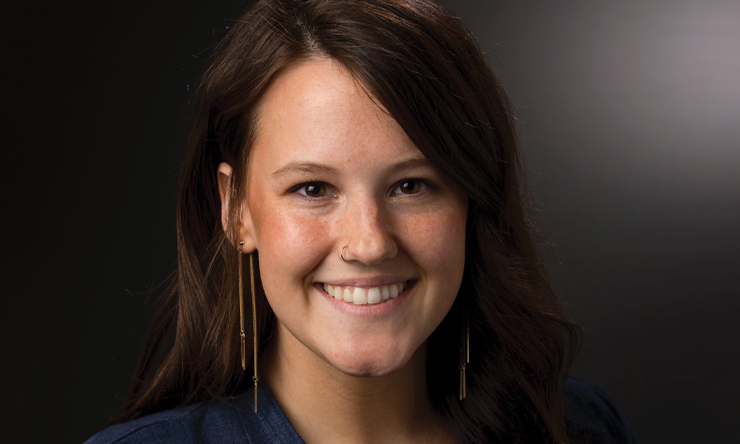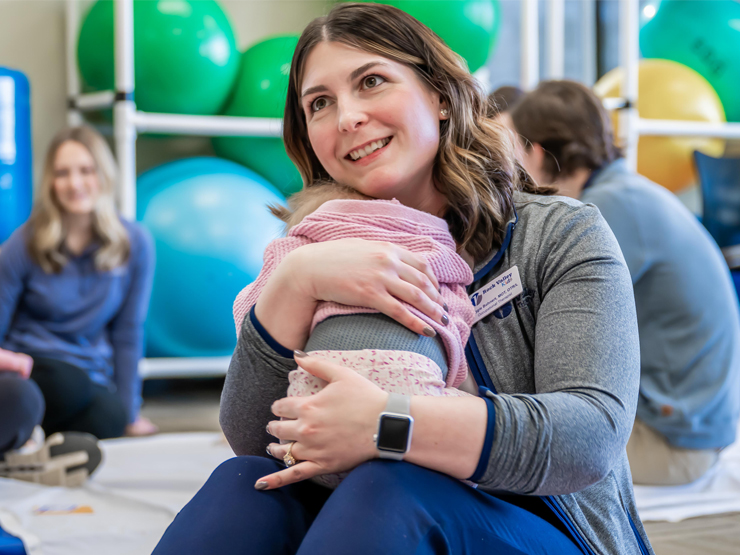"It happened in India," says Troy Johnson '00. A Moment of silence follows as he reflects on the life-altering course charted for him on that evening 10 years ago.
After a day spent in a remote village in central India, Johnson and the other St. Ambrose students who'd made the unprecedented month-long service trip to India led by Rev. Robert "Bud" Grant '80, PhD, were making their departure through a crowd of cheering Indian orphans. It was the idea that these young children were so grateful traveled from afar to be with and learn from them.
Amid the commotion, he couldn't take his eyes off one particular child, a young girl who had stayed by his side most the day. As he sat on the bus that would take them away forever, that same girl approached his window, reached up to Johnson, and put something in his hand: a necklace. Her necklace.
"It was probably the most valuable thing she had," he says.
Without thinking twice, he handed her the ring on his finger as the bus pulled away. It was the last he saw of her.
Or so he thought.
Back at St. Ambrose, Johnson was rummaging through the students' photos from the trip. There she was, caught on film and just as vibrant as he remembered her.
A decade later, the black-and-white image of that nameless Indian child is displayed in a frame in Johnson's Arlington, Va., apartment and serves as the screensaver on his computer at work.
"For me, India was heartbreaking," Johnson says. "To be from such a rich country, to have the benefits of nutrition, political stability, physical health, education ... and then to go to a place like India, where people don't have those things.... What do you do with that?
"Don't get me wrong-each of us should take advantage of every opportunity we have. But we've also got to be mindful that not everyone is presented with the things that may seem a ‘given' to us. So where I can-where we can-we should give to those who haven't had those benefits. That's what motivates me to do what I do."
For Johnson, that work started in the Quad Cities at Project Renewal in downtown Davenport, a program that offers a safe and positive environment for low-income families. Johnson served as a camp counselor and after-school volunteer there for two years. "There are opportunities to serve others all over the place-including down the street from our respective homes. You don't have to cross an ocean to give of your time and talent to others," he says.
Yet Johnson's work would indeed propel him all around the world. After graduating with a bachelor's degree in education from St. Ambrose, he was a Peace Corps volunteer in youth development in Kazakhstan. Subsequently, while a graduate student in international development at Ohio University, he would go to Indonesia to study the habits of democracy among the Muslim groups there. He also interned at the Wahid Institute in Jakarta and served on a delegation to Indonesia as part of the university's Inter-religious Dialogue Project. After he graduated, a Fulbright Scholarship allowed him to continue researching the topic back in Indonesia.
There, Johnson examined the Voter Education Network of the People Program during the country's 2006-07 elections, researching and assessing how the effort communicated voter needs to candidates and how effectively candidates reached marginalized groups.
"It's amazing how much Americans take basic communication for granted-the freedom we have to express our beliefs and the responsibility we have to do so, well, responsibly," he says.
Johnson's work in Indonesia ties directly to the work he's doing today as a program coordinator on international projects in Kazakhstan and Liberia through the International Research and Exchanges Board in Washington, D.C. The non-profit organization empowers individuals and institutions in developing countries to build the systems necessary for a vibrant society-things like quality education, an independent media, and strong communities.
"What we're trying to do is empower citizens and community groups to advocate for their interests and build partnerships with their governments even as they hold their governments accountable," he says. "We do this through strategic development and implementation here in Washington, and through ex-patriots and locals on the ground around the world."
In Kazakhstan, Johnson works with the BOTA Foundation, now one of the largest child welfare organization there, to increase the demand and utilization of health and education services through more than $50 million in conditional cash assistance, while also increasing the capacity of social services through a multi-million dollar grants program.
"This is a really cool program," Johnson says, excitement evident in his voice. "What it does for the poorest people in ‘Kaz' is support them by giving them money directly, on the condition that they take advantage of certain services, mostly education and health care. If a woman is pregnant, for instance, and falls below a certain poverty level, we give her money straight-up, if and only if she starts going to a health clinic, gets check ups and begins to develop positive habits that will stay with her for life."
In Liberia, Johnson's work provides training and resources to Liberian civil society organizations and independent media to engage the population in the creation of inclusive, peaceful and sustainable development.
"The government can't just do what it wants to, and the community can't just yell at the government," he says. "We have to find a way to work together, to be heard and develop solutions together. That happens by advocating community engagement, transparent governments and responsible media."
And while that's true for Liberia, he adds "Actually, that's true for America, too."
Johnson says that both the Kazakhstani and Liberian people-even the Indonesians he observed as a Fulbright Scholar-are essentially used to functioning in a manner that's consistent with Western society. The challenge lies in finding a balance of respect and learning from one culture to another, "something else we all could use a reminder of here at home," he remarks.
Although Johnson would love to go back overseas, closer to the beneficiaries of the work he is engaged in, he's also glad to be in the States for a while.
"It's good to be home, to be grounded," he says. "Being here for the last couple of years, I have realized that no matter what you do, whether you sit behind a desk or teach in a classroom or work on Wall Street, there is a socially responsible way that we can do everything. We do have a choice, to make the world better in our own way. We need to realize it, and take action-in every action, every single day."
News
Share This Story



